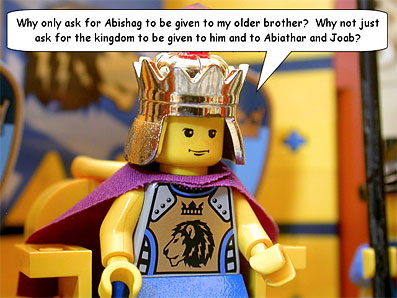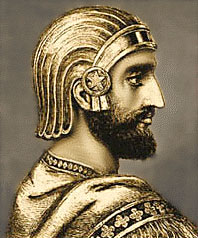Aug
4
2010
or Festivals from the Abyss

Herod, when he saw that he was deceived by the wise men, was exceedingly angry; and he sent forth and put to death all the male children who were in Bethlehem and in all its districts, from two years old and under, according to the time which he had determined from the wise men. Then was fulfilled what was spoken by Jeremiah the prophet, saying: “A voice was heard in Ramah, lamentation, weeping, and great mourning, Rachel weeping for her children, refusing to be comforted, because they are no more.” Matthew 2:16-18
Continuing from New Covenant Virility – 2
GLORIFICATION: (Tabernacles feast, marriage, children, rest)
Wow. This last bit really rubs in the kind of offspring (fruit) Israel gave God. It is the seventh stanza of this section, yet in itself it has seven stanzas. Each section submits itself to the common themes in Glorification, yet each section reiterates one step the sevenfold pattern. Tabernacles was the big feast, so in this final ascerbic prophecy, the prophet turns the annual Feasts into curses. [1] What sublime poetry is Isaiah.
Tabernacles is the Feasts of Booths. It is God’s people reaching maturity as a great tree and sheltering the nations. The cycle began with dry trees (eunuchs, etc.) being made fruitful. Here, God lays the ax to the root of the old tree.
Continue reading
1 comment | tags: Altar of the Abyss, Cyrus, Darius, Esther, Isaiah, Solomon, Tabernacles, Un-Passover | posted in Bible Matrix, Biblical Theology, The Restoration Era
Oct
26
2009

Daniel was taken to Babylon before the destruction of Jerusalem. As the ruler over the king’s advisors, it is highly likely he was involved in the razing of Jerusalem.
The Lord sent Joseph into Egypt as a forerunner, established his house and integrated the old house of Jacob into it. Pharaoh was converted under the ministry of Joseph, humbled himself before Jacob and requested a blessing.
The Lord did the same thing with Daniel. A new house was being established in Babylon before the final demolition of the old Temple. Daniel ascended as “firstfruits”. He stood on the mountain of God as Abraham, as Moses. At the right hand of the power he would bring the curses of the Law raining down upon the Covenant breakers. As Abraham bargained with God, perhaps the mercy shown to Judah’s poor was the work of Daniel.
Continue reading
Comments Off | tags: Babylon, Bible Matrix, Cyrus, Daniel, Esther, Ezekiel, Haggai, Haman, Joshua, Mordecai, Nebuchadnezzar, Zerubbabel | posted in Biblical Theology, The Restoration Era
Jul
27
2009

Eli’s corrupt priesthood came to an end when the Ark was taken by the Philistines. Saul’s corrupt kingdom came to a full end when the Ark returned (hence Michal’s barrenness). The last of Eli’s priesthood (Abiathar) was exiled when Solomon’s government began. Solomon’s kingdom was a new firmament (1 Kings 10:19). Isaiah, however, saw it being rolled up like a scroll (Is. 34:4).
Continue reading
Comments Off | tags: Abiathar, AD70, Ark of the Covenant, Caiaphas, Cyrus, David, Eli, Feasts, High Priest, Literary Structure, Saul, Solomon, Systematic typology, Zechariah | posted in Biblical Theology, The Last Days
Apr
10
2009
James B. Jordan, following the God-given office of Cyrus as shepherd over Israel (Isaiah 44:28), interprets Zechariah 11 as a prediction of events under Greek rule, rather than Roman:
“The wicked Hashmoneans took over the Temple for themselves, and did not give glory to God and restore the true High Priest. The Hashmoneans “buy” the Temple for thirty pieces of silver, but Yahweh rejects their offer, which treats Him and His people as slaves. These evils result in the Jews being broken apart and set at each other’s throats.”1
Either way, the pattern is the same, as the Jews’ apostasy under Greek rule was repeated under Rome, with the “Temple” they sold in the second instance being Christ Himself. Both “Greek” and “Roman” interpretations link the events of chapter 10 to chapter 12, and echo the judgments upon false shepherds by the pre-exile prophets. And in both cases, it is the “Temple” seen by Ezekiel that is being judged. The flock is divided and the Temple made desolate under Antiochus Epiphanes (Greece), and under Christ and Titus (Rome).
The most important factor is that in both events, the Jews’ compromise left them without a true High Priest, and thus no true Atonement.
_______________
See James B. Jordan, The Handwriting on the Wall, p. 585-587.
Comments Off | tags: Antiochus Epiphanes, Atonement, Compromise, Cyrus, Ezekiel's Temple, High Priest, Isaiah, James Jordan, Temple, Zechariah | posted in Biblical Theology
Apr
10
2009
 For the ancient world, a garden, a house, a city or a temple was like a woman. An invading army, after storming through the gates of a city, would rape the virgins. It was a brutal reminder that, like the women, the conquered city was not impregnable.
For the ancient world, a garden, a house, a city or a temple was like a woman. An invading army, after storming through the gates of a city, would rape the virgins. It was a brutal reminder that, like the women, the conquered city was not impregnable.
“In order to understand this, we have to think like ancient Hebrews, and not like modern people… Adam was supposed to guard the garden, and he was also supposed to guard his wife.
The Song of Solomon compares the woman to a garden several times in the course of the book. In all languages, the words for city, garden, and the like are feminine, and we speak of a city as “she” in English today.
Let us take a look at the city in the Bible, remembering that what is said of the city is also true of the house, tent, Temple, Tabernacle, and other enclosed homes for humanity. The city has walls and gates. The purpose of these walls and gates is to keep the enemy out. The goal is that the city be impregnable, and note that English word – it directly connects the city with the woman. Thus, the city has to be a virgin, sealed against attack. Jerusalem is referred to as an impregnable virgin repeatedly in Scripture (2 Kings 19:21; Is. 37:22; Jer. 14:17; 18:13; Jer. 31:21; Amos 5:2). The attack on Jerusalem is thus the rape of a city (Lam. 1:15; 2:13)… Just as Eve was “built” from Adam (using an architectural term, Gen. 2:22), so Jerusalem would be rebuilt as a virgin (Jer. 31:4)… Thus, the safety and security of the virgin daughters of Israel was a symbol of the safety and security of the whole land. Their inviolability corresponded to the inviolability of the whole culture (Lam. 1:4; 2:10).”
In the case of Babylon, its walls and gates were impregnable. The city was built on the Euphrates river, which ebbed into the city under the wall. Even the banks of the river were protected by metal gates from any invaders who could hold their breath long enough. Under Belshazzar, Babylon lost her virginity (Isaiah 47:1-3), and during the feast her river gates had been left open.
In a brilliant military manoeuvre, Cyrus the Great gave the signal for his troops upstream to divert the river. The invading army marched into the city dryshod and took it with little resistance. There were hints of this in the prophecies of both Isaiah (44:27) and Jeremiah (50:38, 51:36). The waters of the bringer of the “flood” were dried up. The Land was rising from the deep.
___________________
James B. Jordan (concerning the virginity of Jephthah’s daughter), Judges: God’s War Against Humanism, p. 211-212. Download from www.biblicalhorizons.com
Comments Off | tags: Babylon, Belshazzar, Cyrus, Greater Eve, James Jordan, Judges | posted in Biblical Theology, The Restoration Era, Totus Christus
Apr
8
2009
“…though Jews returned to the land after the decree of Cyrus, they did not enjoy the fruits of it (Haggai 1:1-11). They were still alienated from the land. They did not really occupy it until they rebuilt the Temple, which was completed in the sixth year of Darius, 20 years later.”1
Darius listened to those who opposed the Jews and ordered the Temple reconstruction to officially cease, so the Lord raised up two witnesses, Haggai and Zechariah. Haggai would chastise the people for neglecting the house of God, and stir up their hearts to finish it. Zechariah would deal with the spiritual war going on behind the scenes.
Zechariah’s visions perform the same function as Abram’s animal sacrifice. (In Abram’s time, there was a famine in the Land, and later it did not support Abram and Lot’s flocks). In Zechariah, the mediator who is “passed over” is not Abram but Joshua the High Priest. The sins are atoned for again, but not with animal sacrifices. In Zechariah it is the Angel of the Lord who steps in, chases away the accusations of Satan (as the ravens), and provides clean robes as a New Covenant.
Then the Temple could be completed, and the abundant fruits of a recreated Land were enjoyed by a new Israel.
________
1 James B. Jordan, Jubilee,
Biblical Chronology Vol. 5, No. 4, www.biblicalhorizons.com
Comments Off | tags: Abraham, Atonement, Covenant curse, Cyrus, Darius, Famine, Haggai, High Priest, James Jordan, Lot, Temple, Two witnesses, Zechariah | posted in The Restoration Era





























